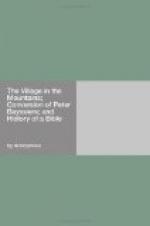Thus, my children, I discovered that these two primary doctrines of the Romish church, viz. purgatory and the supremacy of St. Peter, had not, at any rate, been inculcated by the writers of the Gospel. I cannot tell you what interest I felt in the new ideas I had acquired. The New Testament, which I was still far from regarding as a divine revelation, appeared to me a collection of precious documents, in whose authority I then began to feel some degree of confidence. Though I found this study novel and difficult to a poor uneducated artisan like myself, it was at the same time so attractive to me, that I was induced to continue my researches.
I have already mentioned to you, my dear children, the invincible repugnance which I had always felt to receiving the sacrament as administered in the Romish church. I have said that nothing in the world could have forced me to this act, by which it is profanely pretended that the creature EATS his Creator!! I could never even think of it without shuddering. This doctrine, which asserts that Jesus Christ is present, in body and in spirit, in the consecrated wafer, and that every communicant is actually nourished by his flesh and blood, is, of all the tenets of popery, that which contributed the most to alienate me from the Christian religion, to which I attached it, and to drive me to infidelity.
This, therefore, now attracted all my attention; and again I began to read the New Testament, entirely occupied, as previously, by the one object which I had in view.
I found nothing in the three Gospels of St. Matthew, St. Mark, or St. Luke, which gave me the least reason to suppose that their author had recognized the real and corporeal presence of Jesus Christ in the sacrament of the holy supper. The words of the institution, as related by the first, Matt. 26:26, 27, 28, by the second, Mark, 14:22, 23, 24, and by the third, Luke, 22:19, 20, reported with slight variations by the three Evangelists, and which I took great pains to collate and compare, conveyed no other idea than that of a commemorative ceremony, designed to preserve and call to remembrance the sufferings, the passion, and the death of Christ. In my then wretched condition of unbelief, the magnitude, the sanctity, and the power of the sacrament did not strike my mind; but, excepting that, I imbibed from the consideration of these passages the views which I still hold. So far, then, I had not discovered the doctrine of the real presence; but I thought I had indeed found it specifically established when I read these words: “I am the living bread which came down from heaven: if any man eat of this bread, he shall live for ever; and the bread that I will give is my flesh, which I will give for the life of the world. The Jews, therefore, strove among themselves, saying, How can this man give his flesh to eat? Then Jesus said unto them, Verily, verily, I say unto you, except ye eat the flesh of the Son




